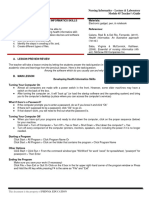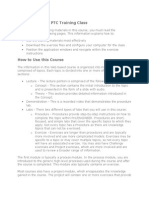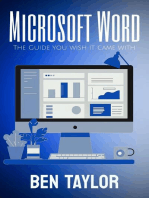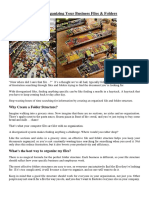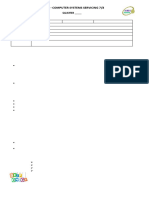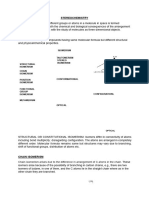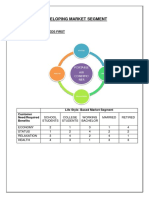0 ratings0% found this document useful (0 votes)
General Instructions
General Instructions
Uploaded by
Alvin PaboresThis document provides 10 general instructions for completing module activities in Microsoft Office. Students are advised to use Office 2010 or newer, read instructions before starting activities, and complete the 4 units of module 2 sequentially. Each unit contains reading materials and specific activities. Formatted files are provided to avoid starting from scratch. Students should save their work frequently using the "Save As" function to avoid overwriting original files. All activities should be followed as instructed and saved in folders without mixing files from different units. Collaboration is allowed but copying work is prohibited. The goal is to familiarize students with the applications through hands-on practice.
Copyright:
© All Rights Reserved
Available Formats
Download as DOCX, PDF, TXT or read online from Scribd
Download as docx, pdf, or txt
General Instructions
General Instructions
Uploaded by
Alvin Pabores0 ratings0% found this document useful (0 votes)
This document provides 10 general instructions for completing module activities in Microsoft Office. Students are advised to use Office 2010 or newer, read instructions before starting activities, and complete the 4 units of module 2 sequentially. Each unit contains reading materials and specific activities. Formatted files are provided to avoid starting from scratch. Students should save their work frequently using the "Save As" function to avoid overwriting original files. All activities should be followed as instructed and saved in folders without mixing files from different units. Collaboration is allowed but copying work is prohibited. The goal is to familiarize students with the applications through hands-on practice.
Original Description:
inctrucion
Copyright
© © All Rights Reserved
Available Formats
DOCX, PDF, TXT or read online from Scribd
Share this document
Did you find this document useful?
Is this content inappropriate?
This document provides 10 general instructions for completing module activities in Microsoft Office. Students are advised to use Office 2010 or newer, read instructions before starting activities, and complete the 4 units of module 2 sequentially. Each unit contains reading materials and specific activities. Formatted files are provided to avoid starting from scratch. Students should save their work frequently using the "Save As" function to avoid overwriting original files. All activities should be followed as instructed and saved in folders without mixing files from different units. Collaboration is allowed but copying work is prohibited. The goal is to familiarize students with the applications through hands-on practice.
Copyright:
© All Rights Reserved
Available Formats
Download as DOCX, PDF, TXT or read online from Scribd
Download as docx, pdf, or txt
0 ratings0% found this document useful (0 votes)
General Instructions
General Instructions
Uploaded by
Alvin PaboresThis document provides 10 general instructions for completing module activities in Microsoft Office. Students are advised to use Office 2010 or newer, read instructions before starting activities, and complete the 4 units of module 2 sequentially. Each unit contains reading materials and specific activities. Formatted files are provided to avoid starting from scratch. Students should save their work frequently using the "Save As" function to avoid overwriting original files. All activities should be followed as instructed and saved in folders without mixing files from different units. Collaboration is allowed but copying work is prohibited. The goal is to familiarize students with the applications through hands-on practice.
Copyright:
© All Rights Reserved
Available Formats
Download as DOCX, PDF, TXT or read online from Scribd
Download as docx, pdf, or txt
You are on page 1/ 1
General Instruction- Please Read.
1. Everyone is suggested to use a Microsoft Suite (Word, Powerpoint, Excel)version 2010
and onward, version lower than 2010 might be a little different and you will possibly
confuse where to look all the tools/functions that is stated on the given module activity.
It is suggested to read first the module instruction (the PDF format) before you start the
activities as to avoid redundancy and confusion on the instructions.
2. There are four(4) units that composes the Module 2, every unit has its own reading
material (pdf file) and likewise specific activities to be followed and completed in it.
3. Inside every unit folder there are files (i.e. WD A-1) for Unit A which are a preformatted
files that are needed for the activities. Please make sure you will not overwrite the
original file, save a copy of your own so that you will be able to go back to the original
file if so happen that you need to start all over again in the activity. The said file(s) are
given to avoid starting from the scratch, all you need is to do is to use the file as
instructed on the given activity file (the PDF file or the Skills review file) as your starting
document for editing.
4. Please use the SAVE AS function in saving your activity to avoid overwriting every file. It
is expected to generate multiple version of the same files for every given activity. For
every changes/editing of the file(s) use the SAVE AS function/command.
5. Follow the instructions In the Skills Review file to complete all the tasks. Do the activity
in sequence to avoid missing any item on the activity. The term/word(s) in green color
are need to be typed and the term within [ ] are commands that are needed to be
executed by pressing them on your keyboard (i.e. [Tab] – means pressing the keyboard
function Tab).
6. All the items on the Skills Review files are need to be accomplished, except those that
needs printing. No need for a hard copy, all activities within every unit must be saved
accordingly in a single folder to avoid mixing them to files on the other unit folder. Keep
your activity files within your laptop/PC, and you will be given instruction when to send/
upload your files accordingly.
7. Again, every time you made changes to a certain file use the SAVE As method so save
your files to avoid overwriting the previous file. It is expected to have numerous files
even within a single activity as instructed.
8. In saving each file use the original file name followed by the title of the activity/task and
your initial.
9. You may collaborate with your other classmates if you need to especially to those that
are more knowledgeable in the applications, but avoid copying their work because I will
definitely know if you copied them and I will not count them as your activity and you will
lose point for that.
10. Though this subject does not need a creative reasoning nor a complex analysis to
passed, the nature of the activities is more on familiarizing by accomplishing an outputs.
You will learn as you do it and will much remember them if you do it yourself. You are
highly encourage to obey the principle of “learning by doing.”
Thank you.
You might also like
- Class # - : Radiometric Dating Practice Name: - Core 1 2 3No ratings yetClass # - : Radiometric Dating Practice Name: - Core 1 2 33 pages
- Do-File Templates & Do-File Basics: Why Standardize and Annotate Your Do-Files?No ratings yetDo-File Templates & Do-File Basics: Why Standardize and Annotate Your Do-Files?7 pages
- L5 Part 1 - File Structure in EDM (EDM101)No ratings yetL5 Part 1 - File Structure in EDM (EDM101)8 pages
- File and Folders Topic 3 Computer ApplicationNo ratings yetFile and Folders Topic 3 Computer Application7 pages
- Applying 5s On Your Computer: Argel Jermen A. Juan100% (1)Applying 5s On Your Computer: Argel Jermen A. Juan23 pages
- It's Free!: Ascii Binary Online Service ProviderNo ratings yetIt's Free!: Ascii Binary Online Service Provider7 pages
- Files For Data Handling: Check Validity of File Opening Writing Data Onto Files Reading Data From FilesNo ratings yetFiles For Data Handling: Check Validity of File Opening Writing Data Onto Files Reading Data From Files15 pages
- Part 1 of 4: Visual Studio Community Introduction (25%)No ratings yetPart 1 of 4: Visual Studio Community Introduction (25%)5 pages
- 11 Best Practices For Organizing Your Business Files100% (1)11 Best Practices For Organizing Your Business Files4 pages
- Backing Up Linux and Other Unix-Like SystemsNo ratings yetBacking Up Linux and Other Unix-Like Systems6 pages
- Handling Computer Files (Teachers Guide)No ratings yetHandling Computer Files (Teachers Guide)16 pages
- Now and Get: Best VTU Student Companion App You Can GetNo ratings yetNow and Get: Best VTU Student Companion App You Can Get55 pages
- Week - 1 - Getting - Started in RStudio - 2023No ratings yetWeek - 1 - Getting - Started in RStudio - 202318 pages
- The Linux File System Structure ExplainedNo ratings yetThe Linux File System Structure Explained7 pages
- How To Save in SOLIDWORKS - File Save, Save As Copy, and More - GoEngineerNo ratings yetHow To Save in SOLIDWORKS - File Save, Save As Copy, and More - GoEngineer8 pages
- Certificate of Participation: Gov. Felicisimo T. San Luis National Agro-Industrial HSNo ratings yetCertificate of Participation: Gov. Felicisimo T. San Luis National Agro-Industrial HS1 page
- Ellc Rmnbemae Llce Bmmneera Lecl Mebmaren Lcel Nbmemaer: Cell MembraneNo ratings yetEllc Rmnbemae Llce Bmmneera Lecl Mebmaren Lcel Nbmemaer: Cell Membrane9 pages
- Nick Wanted To See How High An Ice Cube Would FloaNo ratings yetNick Wanted To See How High An Ice Cube Would Floa4 pages
- Earth and Life Science - Module 5 and Module 6 (Key)No ratings yetEarth and Life Science - Module 5 and Module 6 (Key)6 pages
- Video Questions Bozeman Science: "The Origin of Life - Scientific Evidence"No ratings yetVideo Questions Bozeman Science: "The Origin of Life - Scientific Evidence"2 pages
- Seminar Topics (Approval) - ALVIN PABORESNo ratings yetSeminar Topics (Approval) - ALVIN PABORES2 pages
- Nicolas Steno, A Dane Living in The Medici CourtNo ratings yetNicolas Steno, A Dane Living in The Medici Court14 pages
- Assessment Task: Genetic Engineering: Pros & ConsNo ratings yetAssessment Task: Genetic Engineering: Pros & Cons13 pages
- Celdon Garage - Sheet - E101 - ELECTRICAL PLANSNo ratings yetCeldon Garage - Sheet - E101 - ELECTRICAL PLANS1 page
- Detailed Estimate: Government of Madhyapradesh Name of Road - Devari To Kalkoti RoadNo ratings yetDetailed Estimate: Government of Madhyapradesh Name of Road - Devari To Kalkoti Road6 pages
- Astral Signposts, The Stages of Out-Of-Body Experiences100% (1)Astral Signposts, The Stages of Out-Of-Body Experiences15 pages
- Worksheet - Reaching The Age of AdolescenceNo ratings yetWorksheet - Reaching The Age of Adolescence6 pages
- 11 Steps To Better Software Design Today.: Object CalisthenicsNo ratings yet11 Steps To Better Software Design Today.: Object Calisthenics13 pages
- Emulating Web Services and RPCs With Copaiva (By Anthony Ferrara, Dayle Rees, and Taylor Otwell)No ratings yetEmulating Web Services and RPCs With Copaiva (By Anthony Ferrara, Dayle Rees, and Taylor Otwell)6 pages
- Forest and Wildlife Resources(Question and answer)No ratings yetForest and Wildlife Resources(Question and answer)6 pages
- Samir Karki Psy Practicum Altruism ReportNo ratings yetSamir Karki Psy Practicum Altruism Report8 pages
- Emergency Response Plan COVID19 V2.6 Supplementary 2No ratings yetEmergency Response Plan COVID19 V2.6 Supplementary 230 pages

















